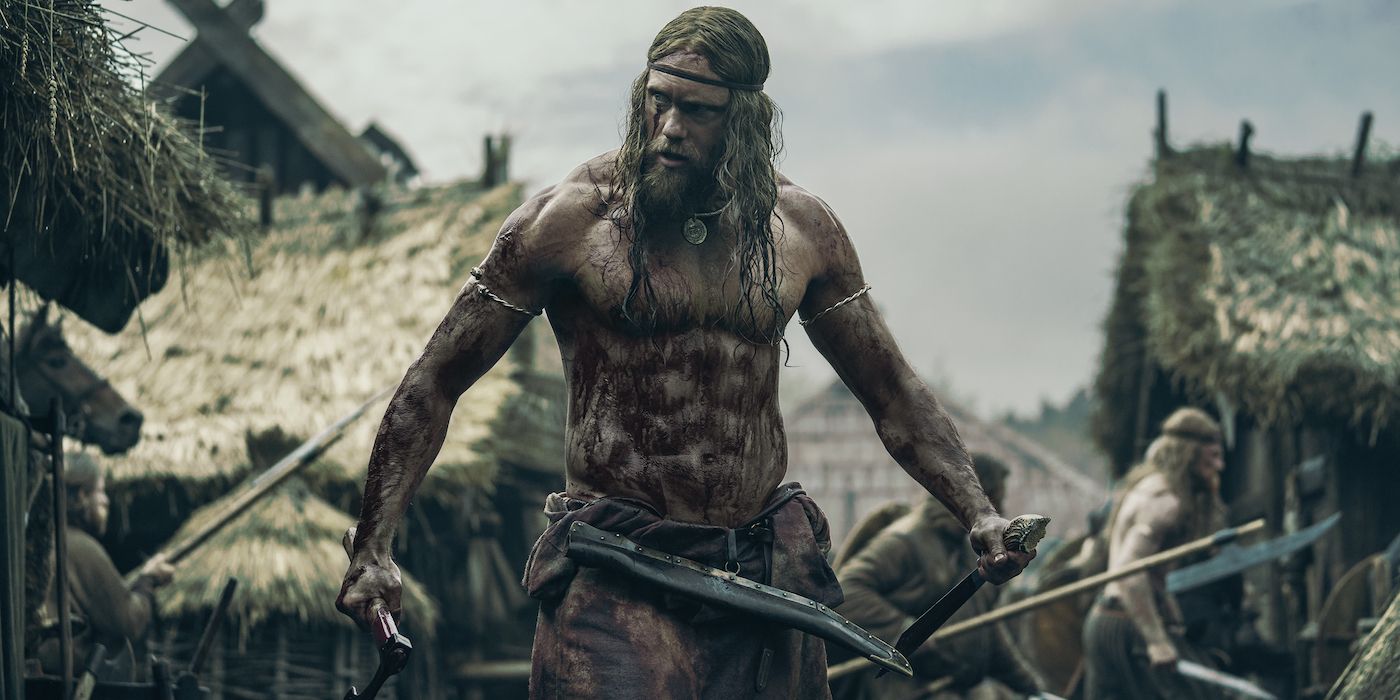Warning: Contains SPOILERS for The Northman
Robert Eggers’ The Northman is a period-piece revenge epic with one trick in its story that elevates it above the likes of Gladiator and Braveheart, at least in terms of its character motivation. While Gladiator and Braveheart are both critically successful and are arguably more epic films than The Northman, Robert Eggers’ tale includes elements that allow its story more focus. These elements come from the period The Northman is set in, around 900AD.
The Northman is set in the days of the Vikings and tells the story of a young Viking prince named Amleth. When Amleth’s father is killed by his uncle Fjolnir, and his mother taken as the latter’s wife, Amleth vows revenge against Fjolnir. This sets Amleth, portrayed by Alexander Skarsgard, off on a quest to exact his vengeance against the man who wronged him and his family, leading Amleth to encounter many different mythological and legendary elements of Old Norse culture.
It is these Old Norse elements in which The Northman’s revenge tale truly comes to life, elevating it above the aforementioned revenge tales of earlier Hollywood. The Northman is extremely accurate to the period in which it is set, as is par for the course with Eggers films. Because of this, the film steeps itself very accurately in ancient Nordic lore to elevate its revenge tale above the cliches of the genre. Again, while films like Gladiator and Braveheart certainly work in their own right, being two of the most well-received epic revenge tales, both of those films contain conventional revenge tropes. They feature main characters, who have lost people close to them, who then rise as an underdog to confront those who have wronged them. While The Northman certainly follows those tropes, its exploration of Norse culture gives Amleth’s revenge motivation reasons for existing besides his own personal feelings. The exploration of fate, which Vikings deemed was the most powerful thing in the universe, is one of the Old Norse elements included that give Amleth’s quest meaning. Ancient Vikings’ beliefs in Norse mythology meant they believed every single man, and even god, was bound to a certain fate that could not be escaped, with Amleth believing his fate is to get revenge against Fjolnir for the murder of his father.

This aspect of fate also ties into another element that gives Amleth’s revenge reason for existing. Early in the film, Amleth and his father engage in a ritual. This ritual is almost a coming-of-age ritual for Amleth, with his father bestowing the duties of a king upon him. During this ritual, it is also stated that, should Aurvandill be killed dishonorably, Amleth is spiritually bound to exact vengeance on those responsible. This, along with the concept of Amleth’s revenge being predetermined through fate, gives Amleth’s quest meaning for the story, outside of simple character motivations like Gladiator and Braveheart.
Finally, another ancient Norse aspect that gives Amleth motivation is that of the seeress. During The Northman, Amleth meets a seeress who explains that the path ahead of him that will lead to his revenge. Norse seeresses were significant religious figures who were said to be able to see the future and fates of men, meaning they had high status in Viking society. Through the inclusion of a seeress, the ritual, and the concepts of fate all binding Amleth to his revenge, The Northman‘s revenge aspect is fleshed out considerably more than usual revenge epics. As attention to detail, especially in terms of accurately depicting different time periods, is incredibly important to Eggers, these elements are all steeped in actual Norse legends believed by ancient Vikings. Through Norse accuracy, The Northman is elevated, at least in terms of its revenge plot, above other films of the overpopulated genre.




